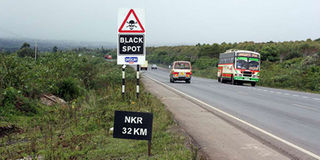New traffic law ushers in era of instant fines

Warning signs on the Nakuru-Eldoret highway. Traffic offenders will be required to pay instant fines. PHOTO | FILE | NATION MEDIA GROUP
What you need to know:
- The amendments were developed to enhance certainty in handling minor offences, which has been lacking.
- The current process is also 100 percent manual - making revenue leakages possible because there is lack of transparency in the collection of fines.
Two years after the Traffic Act was amended to allow for instant fines to be slapped on motorists who flout traffic rules, Kenyans should now brace themselves for its implementation which begins next month.
A task force is currently fine-tuning modalities on how the new rules will be effected by the National Transport and Safety Authority (NTSA), following a verdict by the High Court last week paving way for their implementation.
The law should have taken effect in 2016 but was temporarily suspended by the court.
According to Interior Cabinet Secretary Fred Matiang’i, the rules make economic sense since most of the traffic offenders held in remand “end up paying fines less than the amount the government spends to sustain them”.
BACKLOG
Since its establishment in 2014, the main concern Kenyans have raised with NTSA is the need to introduce instant fines because of the long period it took to argue matters in court even for minor offences.
Mr Robert Ngugi, NTSA deputy director of legal services, says that, before the amendments on the Traffic Act, it provided for the maximum penalty applicable for various traffic offences instead of a fixed penalty.
This, therefore, meant that the penalties applicable in each individual case had to be determined by the court.
The situation, which has prevailed to date because the application of the instant fines was suspended, has led to a huge backlog of traffic cases in court, time wastage (to the traffic offender, police and court), uncertainty as to the fine applicable, stigma and embarrassment to those taken to court, and use of significant resources in prosecuting minor offences.
“There are also inconsistencies in the administration of justice, because the courts levy different penalties for the same offence which has led to the perception of unfairness,” Mr Ngugi.
BRIBE
The current process is also 100 percent manual - making revenue leakages possible because there is lack of transparency in the collection of fines.
The inconveniences involved, especially to the traffic offenders who would spend a whole day in court just to pay say Sh2,000 penalty, has encouraged some of them to issue bribes among other corrupt activities so as not to be taken through the whole process that is time consuming.
However, since section 117 of the Traffic Act empowers the Transport Cabinet Secretary to prescribe the penalty for minor offences, the amendments were developed to enhance certainty in handling minor offences, which has been lacking.
The penalties for minor offences have been in existence since 1984 but, for some reasons, were rarely applied over the years.
The regulations in 1984 had, for instance, provided that exceeding a speed limit of 50 kilometres per hour or as prescribed by the traffic sign attracted a maximum penalty of Sh300.
BAIL
In formulating the current instant fines, the loopholes which existed in 1984 were identified and an amendment to that list effected, as well as expanding the offences and updating the fines to reflect the current market rates.
Mr Ngugi explains that they have also provided and defined the bail payable by the traffic offender, which has for a long time been at the discretion of the OCPD or head of the police station.
The bail is however corresponding to the fine payable to that particular minor traffic offence, so that those who opt to go to court are not unfairly disadvantaged by being required to deposit bail which is higher than the penalty for offence committed (this is the position currently, the police can ask for bail which is more than the prescribed penalty).




